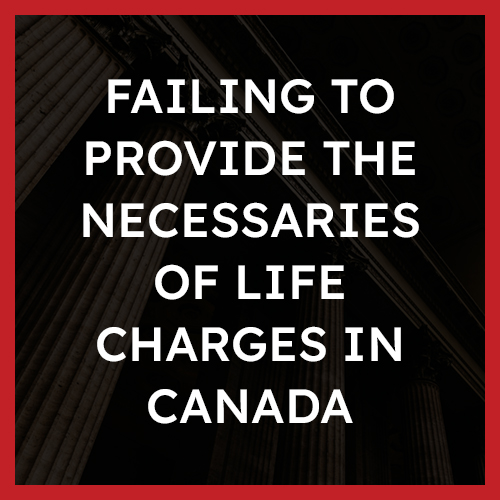Failing to Provide the Necessaries of Life (s. 215) Charges in Canada: Offences, Defences, Punishments
What is Failing to Provide the Necessaries of Life?
 Failing to provide the necessaries of life is covered under s.215 of the Criminal Code.
Failing to provide the necessaries of life is covered under s.215 of the Criminal Code.
This section of the Criminal Code defines circumstances in which a legal duty to provide necessaries of life will arise and creates dual offences for failure or neglect to perform the duty.
Criminalization of failing to provide the necessaries of life aims to “establish a uniform minimum level of care to be provided for those to whom it applies, and this can only be achieved if those under the duty are held to a societal, rather than a personal, standard of conduct.”
Failing to provide the necessaries of life is a hybrid offence. This means that depending on the nature of your circumstances and any aggravating or mitigating factors that are present, the Crown has the option to proceed either summarily or by indictment.
Examples
Some common examples of failing to provide the necessaries of life include the following:
- Failing to provide your child with food;
- Failing to provide your foster child with medical attention;
- Failing to provide your spouse with medical care; and
- Failing to provide food, to person with a mental illness under your direct care;
Defences
Some common defences to a failing to provide the necessaries of life charge may be the following:
- Lack of intent;
- No legal duty imposed;
- Lawful excuse; and
- Any applicable Charter
Punishments
Penalties for a failing to provide the necessaries of life charges depend on whether the Crown elects to proceed summarily or by indictment and whether there is any aggravating or mitigating factors present in your case.
However, the following penalties may be applicable:
- Indictable: up to five years in jail
- Summary: up to 18 months in jail
Overview of the Offence
Failing to provide the necessaries of life is covered under s.215 of the Criminal Code:
215 (1) Every one is under a legal duty
(a) as a parent, foster parent, guardian or head of a family, to provide necessaries of life for a child under the age of sixteen years;
(b) to provide necessaries of life to their spouse or common-law partner; and
(c) to provide necessaries of life to a person under his charge if that person
(i) is unable, by reason of detention, age, illness, mental disorder or other cause, to withdraw himself from that charge, and
(ii) is unable to provide himself with necessaries of life.
(2) Every person commits an offence who, being under a legal duty within the meaning of subsection (1), fails without lawful excuse to perform that duty, if
(a) with respect to a duty imposed by paragraph (1)(a) or (b),
(i) the person to whom the duty is owed is in destitute or necessitous circumstances, or
(ii) the failure to perform the duty endangers the life of the person to whom the duty is owed, or causes or is likely to cause the health of that person to be endangered permanently; or
(b) with respect to a duty imposed by paragraph (1)(c), the failure to perform the duty endangers the life of the person to whom the duty is owed or causes or is likely to cause the health of that person to be injured permanently.
The term “necessaries of life” is not defined in the Criminal Code, rather, it is determined in the circumstances of each case. The term has been interpreted to mean necessaries that tend to preserve life and not necessaries in their ordinary legal sense. The case of R. v. Peterson, 2005 CanLII 37972 (ON CA) further clarified that the phrase “necessaries of life” includes not only food, shelter, and medical attention necessary to sustain life, but also protection from harm.
The term “endangers” refers to exposing someone to danger, harm or risk but does not connote actual injury or damage.
Under s.214 of the Criminal Code a guardian is defined as a person who has in law or in fact the custody or control of a child.
Further, s.214 of the Criminal Code define the terms “abandon” and “expose” to include the following:
- A wilful omission to take charge if a child by a person who is under a legal duty to do so and
- Dealing with a child in a manner that is likely to leave that child exposed to risk without protection.
Under s. 2 of the Criminal Code a “mental disorder” is defined to mean a disease of the mind. Additionally, a “common law partner” means a person who is cohabiting with the individual in a conjugal relationship, having cohabited for a period of at least one year.
In order for the Crown to secure a conviction of a failing to provide the necessaries of life offence they must prove, beyond a reasonable doubt, must establish the legal duty existed, the actus reus, and the mens rea of the offence.
Legal Duty
Under s.215(1) of the Criminal Code a legal duty is imposed to provide necessaries of life in the circumstances of a described relationship.
The concept of a duty indicates a societal minimum which has been established for conduct. This is because a duty would be meaningless if every individual defined its content for themselves according to their subjective beliefs and priorities. Therefore, the conduct of the accused should be measured against an objective, societal standard to give effect to the concept of “duty”.
For the purposes of s.215(1)(a) of the Criminal Code the duty is imposed on a parent, guardian, foster parent, or head of family to provide the necessaries of life for a child under the age of 16. Likewise, s.215(1)(b) of the Criminal Code imposes a similar duty on a spouse or common-law partner.
For the purposes of s.215(1)(c) of the Criminal Code the legal duty is imposed where one person has another under their charge, who is unable, by reason of detention, age, illness, mental disorder or other cause to withdraw themselves from that charge and, further, is unable to provide themselves with such necessaries.
Actus Reus (The Guilty Act)
The actus reus that the Crown must prove, beyond a reasonable doubt, to secure a conviction is that:
- you failed to provide the necessaries of life; and
- the failure endangered the life of the person to whom the duty is owed or caused the person’s health to be endangered permanently
Once it has been established that you did in fact have a legal duty, the Crown needs to satisfy that the actus reus of the offence has been met. This is done by showcasing that you failed to provide the necessaries of life and because you failed to provide the necessaries of life to this person you owed a legal duty to that your failure to do so endangered the person’s life permanently.
Mens Rea (The Guilty Mind)
The Mens that the Crown must prove, beyond a reasonable doubt, to secure a conviction is that:
- it was objectively foreseeable that the failure to provide necessaries would lead to a risk of danger to the life or permanent endangerment to the health of the person under your charge.
As indicated in the case of R v Naglik, [1993] 3 SCR 122 (“Naglik”) the liability imposed by s.215(2) of the Criminal Code is on an objective basis. This objective basis does not depend on the awareness or intention of the accused but on the legal construction of a standard embodied by the “reasonably prudent parent.” Therefore, the court in Naglik indicated that the determination of criminal responsibility depends on “a marked departure from the conduct of a reasonably prudent parent in circumstances where it was objectively foreseeable that the failure to provide the necessaries of life would lead to a risk of danger to the life, or a risk of permanent endangerment to the health, of the child”. However, it is important to note that the court, when considering the specific circumstances of your case, will not take into account any of your personal characteristics that would deprive you the capacity to appreciate the risk.
This means that a conviction under s.215 of the Criminal Code requires actual knowledge of the circumstances which makes the failure to perform the duty to provide necessaries with an offence. It is an offence which may be committed by being wilfully blind, intentionally or recklessly.
Defences
The defences that are available for a failing to provide the necessaries of life charge depend on the facts of your particular case.
However, some common defences to impaired driving charges include:
- No legal duty imposed;
- Lawful excuse; and
- Any applicable Charter
No Legal Duty
In order to be convicted of the offence of failing to provide the necessaries of life, the Crown needs to prove that you breached one of the duties set out in s.215(2) of the Criminal Code. If you are able to showcase that you did not in fact have a legal duty to provide necessaries to the victim, then an essential element of the offence is not made out and the Crown will likely not be able to succeed in their conviction.
Lawful Excuse
The defence of a lawful excuse is found in s. 215(2) of the Criminal Code. The defence of lawful excuse serves to prevent the punishment of the morally innocent, even where you fail to meet the standard of care. Most commonly, courts have described the defence by what it is not. For example, courts have held that lawful excuse rarely arises and does not encompass common law excuses such as duress or authorization by law, as per R v Holmes, 1988 CanLII 84 (SCC), [1988] 1 SCR 914. In Naglik, the court further found that a lawful excuse is not a lack of subjective awareness of the circumstances. If you are able to successfully showcase that you did have a lawful excuse, you cannot be convicted of a failing to provide the necessaries of life charge.
Any applicable Charter defences
The Charter sets out your rights before and after arrest. In the event the police fail to abide by these rights, you may have an applicable Charter defence to your charge:
Common Charter breaches include:
- Section 8- Right to be secure from search and seizure;
- Section 9- Right not to be arbitrarily detained;
- Section 10- Right to be informed of reasons for detention or arrest:
- Section 11- General: legal rights apply to those “charged with an offence”
- Section 12- Cruel and unusual treatment or punishment
If any of your charter rights have been violated, you may be in a position to have any evidence obtained during the breach excluded.
Punishment
Failing to provide the necessaries of life is a hybrid offence which means that the Crown may proceed by indictment or summarily, depending on the circumstances of your case. The following penalties may be applicable:
s.215 – Summary
If you have been convicted of failing to provide the necessaries of life and the Crown elects to proceed summarily you can face up to five years in jail.
You also have the following dispositions available to you:
- Discharge;
- Suspended sentence;
- Fine alone;
- Fine and probation;
- Prison and probation;
- Prison and fine;
- Intermittent;
- Fine, probation, and intermittent; or
- Conditional discharge
s.215 – Indictment
If you have been convicted of failing to provide the necessaries of life and the Crown elects to proceed by indictment you can face up to 18 months in jail.
You also have the following dispositions available to you:
- Discharge;
- Suspended sentence;
- Fine alone;
- Fine and probation;
- Prison and probation;
- Prison and fine;
- Intermittent;
- Fine, probation, and intermittent; or
- Conditional discharge
Some aggravating factors, identified in the case of R v Nickel, 2012 ABCA 158 (CanLII), that may increase the penalty that you receive may include the following:
- use of weapon;
- confinement of the victim;
- use of potentially harmful substances such as drugs or alcohol;
- involvement of third parties; and/or
- multiplicity of victims or offences over time.
Frequently Asked Questions
Can you go to jail for failing to provide the necessities of life?
Yes, you can go to jail for failing to provide the necessaries of life. This is an offence under s.215 of the Criminal Code and you can receive up to 5 years in jail.
Failing to provide the necessaries of life an indictable offence?
Failing to provide the necessaries of life is a hybrid offence. This means that depending on the circumstances of your offence and whether there is any aggravating or mitigating factors present, the Crown may elect to proceed by either indictment or summarily.
What is elder abuse?
Elder abuse is when your intentional acts or your omissions causes harm to an elder. An elder is generally someone who is of the age 60 years or older.
Elder abuse typically occurs at the hands of a caregiver or a person the elder trusts. Some common types of elder abuse include:
- Physical abuse;
- Sexual abuse;
- Emotional or Psychological abuse;
- Neglecting to meet the elder person’s basic needs; or
- Financial abuse.
Published Decisions
R. v. S.J., 2015 ONCA 97 (CanLII)
In this case, the mother and father of a three-year-old child were charged with failing to provide the necessaries of life. When the child was eight months old, he was sent to live with his grandparents in India. Later, the child suffered a seizure and was taken to the Hospital. The child was malnourished, anemic, had low vitamin levels consistent with scurvy, open wounds and scars all over his body. Both parents were convicted and sentenced each parent to six months in jail followed by two years of probation.
You can read the full decision here.
R. v. Peterson, 2005 CanLII 37972 (ON CA)
In this case, the accused was the son of the 84-year-old victim who was charged with failing to provide the necessaries of life. Peterson’s father was dependent. Peterson had a familial relationship with his father and was aware of his father’s dependency. Peterson controlled his father’s living conditions and kept him in an unsafe environment. He had control over his father’s personal care and chose not to make decisions that would ensure his father was provided with the necessaries of life. Because she had not recently been in the home, Peterson’s sister was not in a position to testify about whether Peterson failed to provide the necessaries of life to his father. Peterson was sentenced to six months in jail plus probation for two years and was required to do 120 hours of community service work.
You can read the full decision here.
R. v. Nanfo, 2008 ONCJ 313 (CanLII)
In this case, the accused lived alone with her mother and was her only caregiver. The mother had numerous health conditions. The mother suffered several heart attacks, was incontinent of feces and urine, was almost totally blind, and suffered from dementia and not had been a doctor for two years before her death. When the mother died, the paramedics found the house filthy and cluttered and her body was covered with dried feces, she had many sores over her body and was filthy. The accused was convicted and sentenced to 1 year of house arrest; 100 hours of community service
You can read the full decision here.
About The Author
Ask A Question
We endeavor to respond to questions within 24 hours. If your matter is urgent, please call our office or submit a request for a free consultation.







